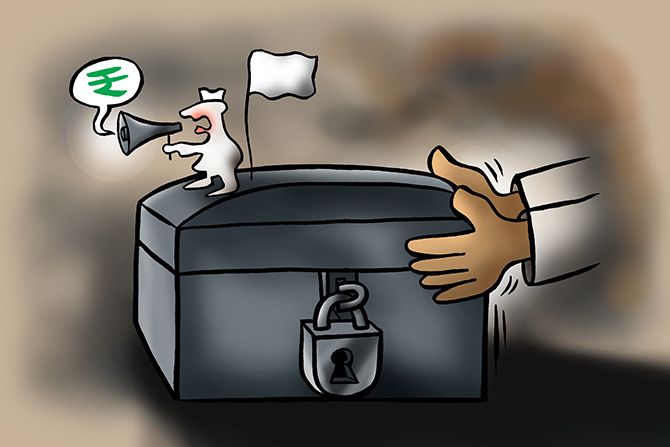The combined fertiliser, food and petroleum subsidy budgeted estimate for FY19 is Rs 2.64 trillion, while the revised estimate is Rs 2.66 trillion.
If the carrying forward to FY20 does not happen, the revised estimates for the major subsidies could actually cross Rs 3 trillion for the first time ever.
Illustration: Uttam Ghosh/Rediff.com

To help meet its revised fiscal deficit target of 3.4 per cent of gross domestic product for 2018-19, the Centre is highly likely to rollover as much as Rs 33,000-35,000 crore in combined food, petroleum and fertiliser subsidies to 2019-20.
Additionally, Business Standard has learnt that the 2019-20 interim Budget assumed an average crude oil price of $65 a barrel for the next fiscal year, the same as this year.
If these sums are not rolled over, the fiscal deficit for this year could be as high as 3.55 per cent of gross domestic product (GDP).
The combined fertiliser, food and petroleum subsidy budgeted estimate for FY19 is Rs 2.64 trillion, while the revised estimate is Rs 2.66 trillion.
If the carrying forward to FY20 does not happen, the revised estimates for the major subsidies could actually cross Rs 3 trillion for the first time ever.
Business Standard has learnt from senior government officials that the petroleum subsidy amount rolled over to FY20 will be around Rs 13,000 crore.
Food subsidy could see a rollover of around Rs 10,000 crore, while fertiliser subsidy rolled over to FY20 may be in the region of Rs 10,000-12,000 crore.
“We are admitting that we will roll over Rs 13,000 crore in petroleum next year.
"This year we had budgeted the subsidies at $65 a barrel. It went to above $80 and then came down again, and hence the higher subsidy bills. For the next year also we have budgeted $65/barrel.
"The budgeted estimates for the next year is more than revised estimates this year because of rolled over payments,” said an official.
In the 2018 calendar year, global crude oil prices reached a four-year high of around $86 a barrel in October and averaged around $73.69 a barrel in April-September.
As on Wednesday, Brent Crude was trading at $61.77 a barrel.
The official, however, added that next year’s food and fertiliser subsidy estimates do not assume any rollovers.
This means that any carried forward amounts under these two heads will add to next year’s subsidy burden. (see table).

For 2019-20, the major subsidies are budgeted at around Rs 2.96 trillion.
Finance Minister Piyush Goyal, while presenting the interim Budget on February 1, kept a fiscal deficit target of 3.4 per cent of GDP as well.
Separately, in an interview with Business Standard, Goyal said, when asked on rolling over of subsidies, “The amount that comes towards the end of year is given the next year. This is routine. But this is not as huge as we inherited from the Congress.”
The official said while there was a mild possibility of food subsidy seeing rollovers, the possibility could not be ruled out.
The person admitted that the government was still in the dark on the status of fertiliser subsidies, since that additional demand comes in March.
“For fertiliser, we will get a demand from the fertiliser companies via the fertiliser ministry in March.
"The additional demand we get in recent years is approximately Rs 10,000-12,000 crore,” the official said.
Successive governments have resorted to time-tested methods of rolling over additional subsidy burden, taking back unspent amounts from ministries, converting certain expenditure entries to ways and means advance, and running down the cash reserves.












 © 2025
© 2025